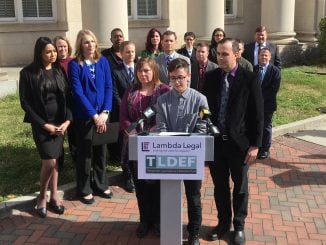
RALEIGH — A lawsuit filed over a North Carolina state law barring gender transition surgery and hormone blockers for minors may have a hurdle to face following the release of a report on the World Professional Association for Transgender Health (WPATH).
The lawsuit, Voe v. Mansfield, says the law (House Bill 808) violates the Equal Protection Clause of the 14th Amendment to the United States Constitution. The plaintiff in the case is a 9-year-old transgender boy from Durham who was given the alias Victor Voe to protect his identity.
Last October, a “statement of interest” opinion was filed in the case by federal officials including United States Attorney Middle District of North Carolina Sandra Hairston and Assistant Attorney General Civil Rights Division Sandra Clarke.
The Voe lawsuit’s claims of harm caused by blocking such surgery and treatments rely heavily on WPATH as a supporting reference.
Journalist Michael Shellenberger, in collaboration with his nonprofit group Environmental Progress, recently published a report about internal WPATH files that he asserts “prove that the practice of transgender medicine is neither scientific nor medical.” Shellenberger suggests gender-affirming care is “unregulated” and “will go down as one of the worst medical scandals in history.”
Shellenberger’s report notes that WPATH has had a strong influence on driving gender-affirming care policies and decisions by major medical societies and associations such as the American Medical Association, the American Academy of Pediatrics and the American Psychiatric Association.
Shellenberger ran for governor of California in 2022, finishing a distant third in a nonpartisan primary with 4.4% of the vote. He also released two installments of the Twitter Files after being given internal documents about the social media platform, now called X, by Elon Musk, who took control of the company in April 2022.
The released WPATH files and video cast doubt on the idea of “informed consent” for transgender medical practices, citing incidents that include minors such as a 10-year-old girl and a developmentally delayed 13-year-old, as well as individuals with serious mental illnesses.
Injuries described in the files range from sterilization to loss of sexual function, liver tumors and even death. Despite knowing that many children and parents lack understanding of the effects of puberty blockers, hormones, and surgeries, WPATH members continue to advocate for gender medicine.
Shellenberger’s WPATH report includes two references to North Carolina, one of which is a quote from an unnamed “gender therapist” on the topic of patients suffering from dissociative identity disorder and consenting to hormone therapy.
“One client who had (dissociative identity disorder), we worked on all alters giving consent to HRT before it was started,” the unnamed North Carolina gender therapist said. “They had alters who were both male and female gender and it was imperative to get all the alters who would be affected by HRT to be aware and consent to the changes. Ethically, if you do not get consent from all alters you have not really received consent and you could be sued later, if they decide HRT or surgery was not in their best interest.”
Underscoring the claims in the WPATH files release is a civil case filed last summer in North Carolina regarding consent issues, medical malpractice and misinformation provided to a 25-year-old woman who was medically transitioned.
Prisha Mosley filed the case in the Gaston County Superior Court. The lawsuit says the defendants provided her with misinformation by telling her transitioning from female to male would resolve her mental health issues.
Mosley attributes most of her mental health issues to being the victim of a sexual assault at age 14, and her lawsuit details significant mental health struggles including anorexia, depression, obsessive-compulsive disorder and engaging in self-harm actions such as cutting.
Some health agencies have stepped back from transgender-targeted hormone therapies and surgeries. The English National Health Service banned children from receiving puberty blockers to treat gender dysphoria in mid-March of this year.
The announcement came after NHS England initiated a review prompted by an increase in referrals to the Gender Identity Development Service (GIDS), which is scheduled to cease operations by the end of March.
“Ending the routine prescription of puberty blockers will help ensure that care is based on evidence, expert clinical opinion and is in the best interests of the child,” UK Health Minister Maria Caulfield said of the policy change.
The move by NHS was followed by the Cass Report, a 388-page document calling into question the main tenet of gender-affirming care such as the use of puberty blockers, citing “weak evidence” it has any positive impact on gender dysphoric patients. The report also says a “medical pathway will not be the best way to manage their gender-related distress,” and that “Clinicians are unable to determine with any certainty which children and young people will go on to have an enduring trans identity.”



